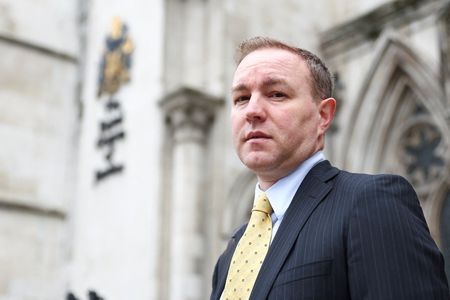By Sam Tobin
LONDON (Reuters) – Tom Hayes, the first trader in the world to be jailed for interest rate rigging, lost his appeal against his conviction on Wednesday, a decision he said he would seek to challenge at the UK’s Supreme Court.
Hayes, a former star Citigroup and UBS trader, was convicted in 2015 of conspiracy to defraud by manipulating Libor, a benchmark rate once used to price trillions of financial products globally.
Prosecutors said Hayes and other traders were acting illegally by taking their or their employer’s commercial interests into account when they made submissions on the London interbank offered rate (Libor).
Hayes was initially jailed for 14 years, with the sentencing judge telling him: “Probity and honesty are essential as is trust … The Libor activities of which you took part puts all that in jeopardy.”
His sentence was reduced on appeal to 11 years and he was released from prison in 2021 after serving half.
Hayes has always said that the Libor rates he requested fell within a permissible range – and that his conduct was common at the time and condoned by bosses.
His appeal against his conviction was heard alongside that of Carlo Palombo, a former Barclays trader convicted in 2019 of skewing Libor’s euro equivalent, Euribor.
Their cases were referred to the Court of Appeal in London after a landmark U.S. court decision in 2022, in which two former Deutsche Bank traders’ convictions for Libor rigging were overturned as there was no prohibition on banks considering their trading position when submitting Libor rates.
But Hayes and Palombo’s appeals were dismissed on Wednesday, with the Court of Appeal ruling that it was illegal to take commercial interests into account when setting rates.
Judge David Bean said both Libor and Euribor “required the submission of what the individual bank ‘could’ borrow, which must mean the cheapest rate available to it”.
SUPREME COURT
Hayes and Palombo have 14 days to apply for permission to appeal to the Supreme Court, which Hayes said he planned to do.
Hayes told reporters: “I’ve not fought for all of these years for nothing.”
Susan Hawley, executive director of campaign group Spotlight on Corruption, said the case “should provoke some real soul searching about whether the right people are ending up in the dock in corporate crime cases”.
“It’s essential that there is now a really conscious shift in prosecution strategy to go after senior executives and far greater use of whistleblowers to gather the evidence against those at the very top of organisations,” she said.
Libor was phased out in 2021 after the rigging scandal prompted global regulators to fine some of the world’s biggest banks billions of dollars. No senior executives have been prosecuted.
Wednesday’s ruling is a blow to Hayes, Palombo and other traders, some of whom had hired lawyers to look into the possibility of bringing their own appeals.
Hayes’ lawyer Adrian Darbishire said earlier this month that the trial judge in the original court case wrongly told the jury it was prohibited to consider commercial interests when setting Libor rates.
But the Serious Fraud Office (SFO), which prosecuted 19 over benchmark rigging and secured nine convictions, said it was illegal to set Libor rates for commercial purposes.
“The Court of Appeal’s judgment is clear that these convictions for fraud are still as relevant today as ten years ago,” an SFO spokesperson said in a statement.
“No one is above the law and the court has recognised that these convictions stand firm.”
(Reporting by Sam Tobin; Editing by Sarah Young, Tomasz Janowski and Jane Merriman)












